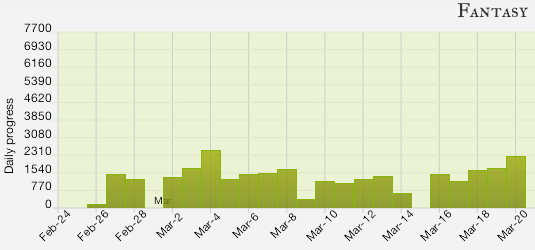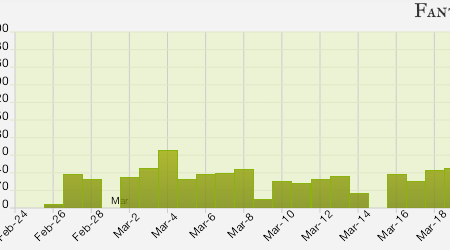☆*:.。. o(≧∇≦o) « Everything is awesome! ♫~ Everything is cool when you have an idea~! )
Life is peachy and nothing can get you down. Why is that? You have an IDEA - a real good one too. Flushed with excitement, you go about your business: a bit of plotting here, some serious brainstorming there.
Before you know it, your engines are revved and you're ready to peel out of the gate. Those first couple of sentences are awkward and embarrassing - or maybe they are so hilarious that you can't help but chuckle as your pen glides along the page or your fingertips dance along the keyboard.
Writing is a breeze, right? So long as you have an awesome idea, churning out a novel is easy-peasy.
You know, I think I have this sarcasm thing down, guys! ヽ(*⌒∇⌒*)ノ
This is not a post whining about how hard it is to actually write (I'll save that for later!); this is a post about the difference between two years and two months.
"Whatever do you mean, Melissa?" You might inquire. And I might cackle devilishly and say, "Why dear reader, you have just played right into my blog post outline!"

I'm talking about focus. If you haven't yet noticed, I am a bit of a daydreamer. My mind wanders, I am aloof and off playing in the clouds - all those nice ways to say that I can barely stick to anything. I procrastinate, I avoid, and it takes an obscene amount of effort for me to buckle down and write.
All of this is basically a death sentence for a writer. As they say, you've got to strike while the iron is hot - or scribble feverishly while your pen still has ink. Much as Stephen King wrote about in On Writing, you have to ride that wave of enthusiasm as long as you can. Write while you are excited about a project; write as much as humanly possible while you want to because you better believe you will hit that brick wall of "ughhhh do not waaaannnnt! (╯︵╰,)"
If you are like me, when you reach the swamp of sluggish agony, you will make every excuse not to work. It is not uncommon to find me crumpled on the floor at this stage, rethinking my life choices and hating every stunted sentence I manage to string together.
Fear not, dear reader! There is hope; it will get easier if you make a plan and stick with it.
The book I wrote before Keystone Calamity didn't have a proper title, but I refer to it as code name Masquerade. Masq was the first new idea I'd had in a long time and I was so pumped to get it going. I had a very rough outline and I dove in. As is common with my writing process, I absolutely hated the first chapter/scene. I was so mortified that I put it down for bit.

A bit turned into a few weeks - and then months. Even when I started thinking about writing as a serious career, I would work on Masq sporadically. I had basic plans, but I never stuck with them. I would go weeks without looking at it, letting the guilt compound until it finally crushed me and I would squeeze a few paragraphs out of my already wrung creative brainsponge. It took me two years to finish writing that book and by the end, it was all over the place.
When I began writing Keystone, I decided that my writing sessions would not be so random. It was so much easier to get through a session when I was excited about my project. If I could establish a routine when I was still pumped about my book, maybe - JUST MAYBE - it would help get me through the swamp of sadness and to the end of the novel.
And it did. It took me two months to write Keystone.
I know everyone is different and some people prefer to forego the planning stages and just jump into a new novel. I can only relay how I have made it work, and if that's your cup of tea, great! If not, feel free to share your own focus methods in the comments!
1. Get the gist of the length of your book. You don't need to have the exact word count (and if you did, colour me impressed) but I find it helps to have the series of events or thread of action established.
- Detail the chapters (optional) Not everyone works in chapters, but if you do, it can be helpful to break the entire book up into rough chapters so you have a feel for the length of each section. Also, if you don't like writing in sequence or you get bored along the way, you can work on another chapter chunk to spice up the monotony.
2. Decide when you can work and how much work you get done. Everyone has different schedules and creative times. Some people can only write on the weekends or in the very early morning before they leave for work. After you figure out when you are able to write consistently, set realistic writing goals for your sessions. There's no shame in knowing you can only churn out 100 words in a session. If your goals are small and more in tune with your abilities and time allotted, it will be easier to get through each work period.
3. Make your schedule. HEY! ALL YOU PROCRASTINATORS! I'm talking to you! MAKE A SCHEDULE! Be as detailed as you want to be, but don't just write into an abyss. Don't just say, "Okay, so I'll write 500 words a day~" and then peace out.
NO.
Which days? How long are you working? Are you taking breaks? It might seem tedious to plot all of this out, but if you do it once, you won't have to do it again. If you have trouble finishing projects, having a routine will help you through it. I am living proof.
Schedule your writing times on a weekly basis, monthly, daily... whatever you want as long as you have structure and a plan. I personally tried for a chapter a week and I got really good at knowing how many sessions it would take to complete a chapter by the end. With a schedule, you will learn your limits very quickly.

4. Track your progress. I bet you're complaining that this post is super long at this point (you're right, I'm sorry) and that I'm giving you homework whereas writing is supposed to be fun/great/freeing (whatever you say). I will counter with How do you know you're succeeding if you have no proof?
Writing a book is hard work. Don't let anyone tell you otherwise unless they are some sort of prodigy - and if they are, can you introduce me? You've done all of this brainstorming, you've scheduled work time... but the end of the novel feels like a jillion pages away.
You will have good writing days and bad writing days. As you can see from the chart above, sometimes, I could barely write a thing. You know what kept me going and contributed to my writing day streak (the program I use says I stuck to my plan for 13 days! That's almost two weeks~)? I had a nice bar counting how many words I'd put in. I had something to show me that even though it felt like I was not moving forward, I really was.
5. Reward yourself and celebrate your successes! Did you get a lot of work done today? Awesome! Have a nice dinner! Maybe you are super ahead of schedule, but you are feeling burnt out - take a day and recharge your batteries by reading a favourite book. A little progress is still progress, and it brings you a little closer to the end.
On that note: I hope this article was helpful! Focus has always been a problem for me and when I found a basic plan, it made my giant mountain of a novel into more manageable ledges to climb. I'm always happy to hear from others about their experiences! How do you find focus? Do you have a plan? Please let me know in the comments!
Here is a link list of some of the items featured in this article:
ON WRITING by Stephen King - Part biography, part writing advice, this book gives a lot of humanity to writing wisdom. I always like reading about the early lives of authors.
Originally posted August 24, 2015.
Subscribe to the blog to receive updates on new content and comment on posts. Neato! ゚*。(・∀・)゚*。

Comments